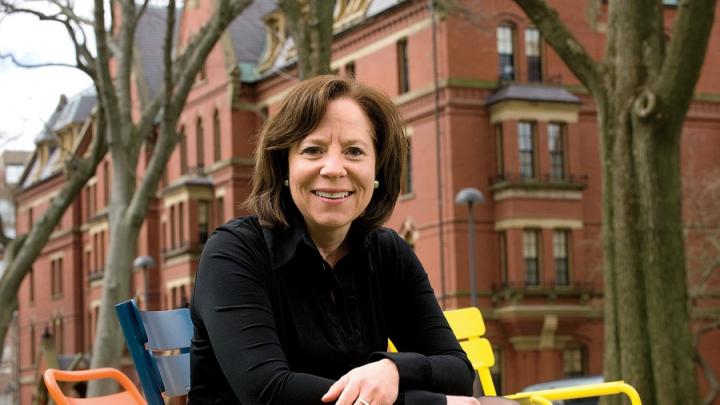Ellen G. Reeves ’83, Ed.M. ’86, is probably the first Harvard Alumni Association (HAA) president to moonlight as a comedienne.
In college she did a comic soap opera with Conan O’Brien at Mather House; later she studied comic writing and performance at Second City. And last fall she created Talk Show, a series of improvised performances run out of a storefront on Manhattan’s Lower East Side.
The show entailed her roaming nearby streets with a microphone, sometimes wearing a red crab hat, conducting interviews with passersby and then inviting her subjects to share the floor for an evening of hilarious, and often educational, conversation. “For six weeks, every night I was writing it, producing it, booking it, recruiting the audience, and then acting in it,” she says. “Most nights I also had to serve the snacks and clean the bathroom. It gave new meaning to the phrase ‘one-woman show.’ It was insane.”
That level of involvement, however, is typical for Reeves. Her simultaneous career paths—writer, editor, educator, and consultant—have run together on intercontinental trajectories for many years. She splits her time among Boston, Providence, Paris, and New York City—where she was variously executive, French fiction, and education editor for The New Press, a nonprofit book publisher co-founded by Diane Wachtell ’83.
Recently Reeves has moved into the career-advising sector, running workshops and giving lectures in conjunction with her 2009 book, Can I Wear My Nose Ring to the Interview? A Crash Course in Finding, Landing, and Keeping Your First Real Job. She has also produced a cookbook in France (she studied at Le Cordon Bleu) as well as a play (written with Bennett Singer ’86) about World War II survivor Gerda Weissmann Klein.
Reeves is one of those ever-busy extroverts who makes it her business to connect people. This secular matchmaking is a cornerstone of her agenda at the HAA, which builds on the “power of the alumni network” theme established by her immediate predecessor, Robert R. Bowie Jr. ’73, last year. She would like HAA board members to be leaders in their home communities as well as in Cambridge, facilitating an event at a local club or encouraging participation in the University’s January Experience and public-service initiatives. “If we use an ‘each one, reach one’ approach,” Reeves explains, “we can easily increase the number of alumni who get a taste of the excitement we feel when we get together.”
She uses the phrase “Harvard is where you are.” That means “Connect. Call a friend, call a roommate, write to a professor or a classmate. Read the Gazette. Read Harvard Magazine,” she urges. See what’s offered at the HAA (http://alumni.harvard.edu) or go to a local club or Shared Interest Group (SIG) event “and introduce yourself to someone. I like to say that if there are two alums in a room, even a virtual one, it’s a reunion.”
This year, the HAA is continuing to reorganize its programs and committees around the life stages of alumni. Reeves is committed to strengthening the culture of the board of directors so that each committee sets “realistic, measurable goals: for example, increasing the number of nominations for awards, elected directors and Overseers, and the number of alumni who vote in these elections.” She is adding a “professional development component” to the board meetings this year, and hoping to better engage alumni leaders themselves in order to attract more active members.
Reeves enjoys ferreting out the University’s lesser-known campus resources, such as the Bureau of Study Counsel and the Collection of Historical Scientific Instruments. She plans to highlight them at upcoming HAA annual board meetings to let people know “all the cool things happening at Harvard.” Her extensive grasp of the University’s offerings stems not only from her two degrees (she also has a master’s in writing from Northeastern University), but from having worked as a volunteer for Harvard for nearly 30 years. Upon graduation, she became her class’s secretary and she has served on or chaired almost every HAA and parallel Radcliffe committee since. She has experience with both domestic and international Harvard/Radcliffe clubs, the Harvard College Fund, and schools and scholarship interviewing, and currently serves on the Harvard Art Museums’ education and engagement committee as well as the advisory board of the American Repertory Theater.
Reeves already knows hundreds of people in disparate corners of the campus. To push others along this course, she paused during her Class Day speech last May and had audience members turn to introduce themselves to someone new. “Don’t wait for someone else to break the ice,” she intoned. “Reach out!”








